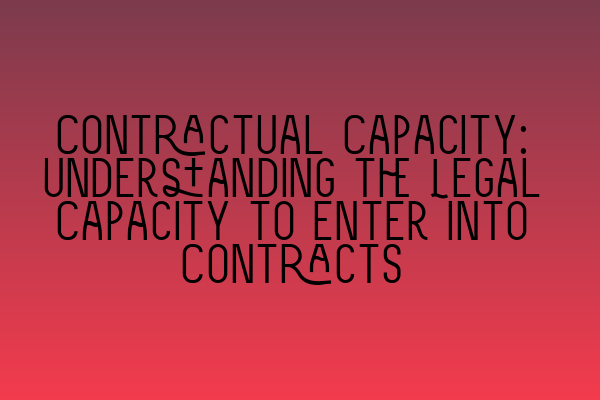Contractual Capacity: Understanding the Legal Capacity to Enter into Contracts
When it comes to entering into contracts, it is crucial to understand the concept of contractual capacity. Contractual capacity refers to a person’s legal ability to enter into a binding contract. It ensures that all parties involved in a contract have the mental capacity and legal authority to understand and fulfill their obligations.
Contractual capacity is a fundamental principle of contract law and serves as a safeguard to protect individuals from unfair or unconscionable agreements. Without proper contractual capacity, a contract may be voidable or unenforceable.
Who has Contractual Capacity?
Not everyone has the legal capacity to enter into contracts. There are certain groups of people who are considered to lack the capacity to contract:
- Minors: Individuals under the age of 18, also known as minors, are generally considered to lack contractual capacity. However, there are certain exceptions and circumstances where minors can enter into contracts, such as for necessities or educational purposes. To learn more about this topic, check out this real-life case studies.
- Mentally Incapacitated Individuals: Individuals who are mentally incapacitated, such as those with severe intellectual disabilities, may lack the legal capacity to enter into contracts. This is because they may not possess the mental ability to understand the nature and consequences of a contract.
- Intoxicated or Drugged Individuals: Individuals who are under the influence of drugs or alcohol may lack the contractual capacity. This is because their judgment and decision-making abilities are impaired, making it difficult for them to fully understand and consent to the terms of a contract.
- Corporations or Organizations: Corporations and other organizations have the legal capacity to enter into contracts. However, their capacity may be limited based on their internal policies or legal requirements. Solicitors can offer insights into this matter, as explained in the article about solicitor salaries in the UK.
Legal Implications of Lack of Contractual Capacity
If one of the parties to a contract lacks contractual capacity, it can have significant legal implications:
- Voidable Contracts: In many cases, a contract entered into by a party lacking contractual capacity is considered voidable. This means that the party lacking capacity has the option to either affirm or disaffirm the contract. If they disaffirm the contract, it becomes void, and the parties are released from their obligations.
- Unenforceable Contracts: In some situations, a contract entered into by a party lacking contractual capacity may be deemed unenforceable. This means that the contract cannot be enforced by either party, and they cannot seek remedies for any breach of contract.
- Ratification: Even if a contract is initially voidable due to lack of contractual capacity, it can be ratified by the party lacking capacity once they gain capacity. Ratification means that the party confirms their intent to be bound by the terms of the contract, making it enforceable.
Best Practices to Ensure Contractual Capacity
As a solicitor, it is essential to ensure that your clients have the necessary contractual capacity before entering into any agreements. Here are some best practices to follow:
- Assess the client’s capacity: Determine whether your client has the mental capacity and legal authority to enter into a contract. If there are any doubts, consult with medical professionals, guardians, or other relevant parties.
- Obtain consent: Ensure that your client fully understands the terms of the contract and consents to its obligations. Take the time to explain the contract in plain and simple language to avoid any misunderstandings.
- Consider alternatives: If your client lacks contractual capacity, explore alternative options such as obtaining legal guardianship, setting up trusts, or seeking court approval for certain transactions.
- Document your due diligence: Keep thorough records of your assessment of your client’s contractual capacity, including any consultations, medical assessments, or guardianship arrangements. These records can be crucial in the event of potential disputes or legal challenges.
Understanding contractual capacity is essential for solicitors to protect the interests of their clients and ensure the validity and enforceability of contracts. By following best practices and staying informed about relevant laws and regulations, solicitors can navigate the complexities of contractual capacity with confidence. If you want to learn more about the skills necessary to build strong client relationships as a solicitor, check out this article on client relationship management skills for solicitors.
For aspiring solicitors, understanding contractual capacity is just the beginning. To pursue a successful career as a solicitor, you need to secure training contracts. Learn more about this process in our comprehensive guide on securing training contracts. And if you’re considering a career in law and want to know more about the education options available in the UK, have a look at our article on pursuing a law school education in the UK.
